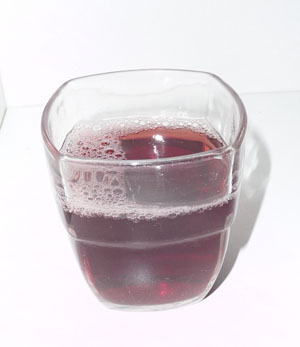Edralin Lucas, Oklahoma State University
Findings have shown that consumption of grape juice is beneficial to the heart of both healthy individuals and those with existing chronic conditions. In healthy subjects, O’Byrne et al. (2002) compared the antioxidant efficacy of two weeks of consumption of Concord grape juice to that of vitamin E. Their findings demonstrated that Concord grape juice flavonoids (a large family of phenolic compounds that includes pigments such as anthocyanins) are potent antioxidants that protect against oxidative stress and reduce the risk of free radical damage and chronic diseases. Another study on healthy subjects by Vinson et al. (2000) demonstrated that one week of drinking grape juice, but not orange juice, protected against LDL cholesterol oxidation. LDL oxidation is one of the key events in accumulation of fat within the vascular wall that leads to the development of atherosclerosis.
In addition to the antioxidant properties of grape juice, its effect on platelet (bits of protoplasm in blood that cause it to clump) function and the tendency to inhibit formation of blood clots in healthy individuals has also been examined (Freedman et al., 2001; Keevil et al., 2000; Pace-Asciak et al., 1996). Consumption of purple grape juice reduced platelet aggregation. This suppression in the formation of blood clots may be one mechanism by which purple grape juice prevents the blockage of arteries and cardiovascular disease (CVD) (Freedman et al., 2001). Another study compared the effect of daily consumption of commercial purple grape juice to that of either orange juice or grapefruit juice on platelet activity (Keevil et al., 2000). The results of this study demonstrated that consuming purple grape juice, but not orange juice or grapefruit juice, reduced whole blood platelet aggregation. This type of reduction in platelet aggregation may contribute to a reduction of risk factors associated with heart attacks. The positive effect of grape juice was attributed to the high phenolic content of grape juice compared to citrus juices (Freedman et al., 2001). However, Pace-Asciak et al. (1996) found that commercial purple grape juice and purple grape juice enriched with trans-resveratrol did not reduce platelet aggregation as effectively as either red or white wine, suggesting that alcohol plays a role in the health benefits of wine along with phenolic compounds.
For those with heart disease
The cardiovascular effects of grape juice were also investigated in subjects with existing heart disease. Stein et al. (1996) investigated the effects of purple grape juice on patients with coronary artery disease (CAD). Their findings demonstrate that short-term ingestion of purple grape juice improves endothelial cell (the thin layer of cells that line the interior surface of blood vessels) function and reduces LDL oxidation, which may in part explain the cardiovascular health benefits of grape juice. Chou et al. (2001) showed that when participants with CAD consumed either one of the two doses of purple grape juice (4.0 or 8.0 ml of juice/kg of body weight twice daily) for 56 days, both doses of grape juice exhibited similar beneficial effects on endothelial cell function. They also observed that when vitamin E supplementation was combined with grape juice consumption, no further benefit was provided. Despite the relatively high carbohydrate content, consumption of purple grape juice was shown to have no adverse effects on lipid and glucose metabolism in these individuals with CAD. In individuals with CAD and taking aspirin, purple grape juice did not provide additional anti-thrombotic effect but was able to suppress inflammatory markers originating from the platelets, another factor linked to CVD (Albers et al., 2004).
A few human studies have also investigated the protective effect of grape juice consumption against high blood pressure (Park et al., 2003; Park et al., 2004; Park et al., 2009). In one of the studies, forty men with mild hypertension (systolic and diastolic blood pressure greater than 130 and 90 mm Hg, respectively) were asked to consume either Concord grape juice or a placebo for a period of eight weeks (Park et al., 2004). The men consuming grape juice experienced a reduction in both systolic and diastolic blood pressure by approximately 5 percent, a modest but significant effect that was not observed in individuals consuming the placebo drink (Park et al., 2004). Similar blood pressure-lowering effects of grape juice were also observed in healthy individuals (Park et al., 2003). A similar study by the same group confirmed their earlier findings indicating the blood pressure-lowering effect of grape juice in men with mild hypertension (Park et al., 2009). They also observed that grape juice favorably affected antioxidant defense systems in these men. The blood pressure-lowering effect of grape juice was also shown to be beneficial in smokers (Park et al., 2003).
Taken together, these studies suggest that consumption of grape juice offers cardiovascular benefits not only to healthy individuals, but also to those with underlying chronic conditions.
References:
Albers, A.R., S. Varghese, O. Vitseva, J.A. Vita, and J.A. Freedman. 2004. The antiinflammatory effects of purple grape juice consumption in subjects with stable coronary artery disease. Arteriosclerosis, Thrombosis, and Vascular Biology 24(11):179-80.
Chou, E.J., J.G. Keevil, S. Aeschlimann, D.A. Wiebe, J.D. Folts, and J.H. Stein. 2001. Effect of ingestion of purple grape juice on endothelial function in patients with coronary heart disease. American Journal of Cardiology 88(5):553-5.
Freedman, J.E., C. Parker III, L. Li, J.A. Perlman, B. Frei, V. Ivanov, L.R. Deak, M.D. Iafrati, and J.D. Folts. 2001. Select flavonoids and whole juice from purple grapes inhibit platelet function and enhance nitric oxide release. Circulation 103(23):2792-8.
Keevil, J.G., H.E. Osman, J.D. Reed, and J.D. Folts. 2000. Grape juice, but not orange juice or grapefruit juice, inhibits human platelet aggregation. Journal of Nutrition 130(1):53-6.
O’Byrne, D.J., S. Devaraj, S.M. Grundy, and I. Jialal. 2002. Comparison of the antioxidant effects of Concord grape juice flavonoids alpha-tocopherol on markers of oxidative stress in healthy adults. American Journal of Clinical Nutrition 76(6):1367-74.
Pace-Asciak, C.R., O. Rounova, S.E. Hahn, E.P. Diamandis, and D.M. Goldberg. Wines and grape juices as modulators of platelet aggregation in healthy human subjects. Clinica Chimica Acta 246(1-2):163-82.
Park, Y.K., E. Park, J.S. Kim, and M.H. Kang. 2003. Daily grape juice consumption reduces oxidative DNA damage and plasma free radical levels in healthy Koreans. Mutation Research 529(1-2):77-86.
Park, Y.K., J.S. Kim, and M.H. Kang. 2004. Concord grape juice supplementation reduces blood pressure in Korean hypertensive men: double-blind, placebo controlled intervention trial. Biofactors 22(1-4):145-7.
Park, Y.K., S.H. Lee, E. Park, J.S. Kim, and M.H. Kang. 2009. Changes in antioxidant status, blood pressure, and lymphocyte DNA damage from grape juice supplementation. Annals of the New York Academy of Science 1171:385-90.
Stein, J.H., J.G. Keevil, D.A. Wiebe, S. Aeschlimann, and J.D. Folts. 1999. Purple grape juice improves endothelial function and reduces the susceptibility of LDL cholesterol to oxidation in patients with coronary artery disease. Circulation 100(10):1050-5.
Vinson, J.A., J. Yang, J. Proch, and X. Liang. 2000. Grape juice, but not orange juice, has in vitro, ex vivo, and in vivo antioxidant properties. Journal of Medicinal Food 3(4):167-71.
Reviewed by Eric Stafne, Mississippi State University and William McGlynn, Oklahoma State University

